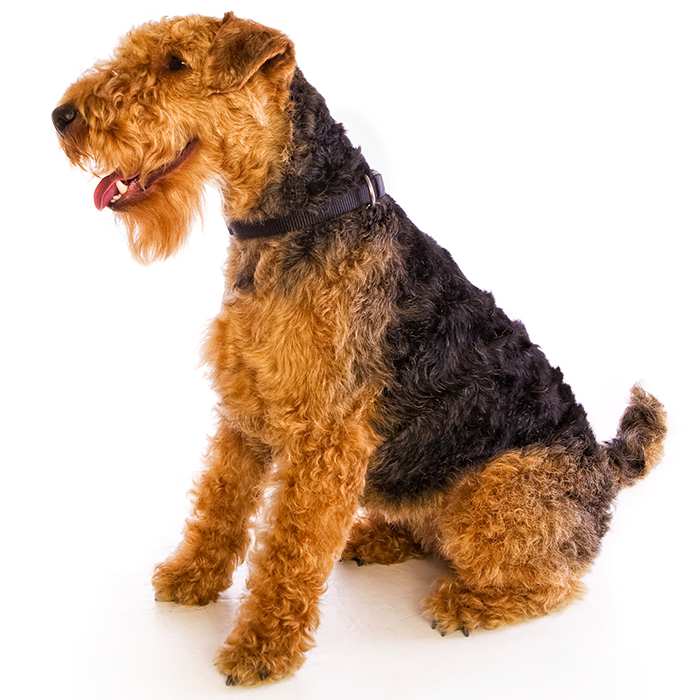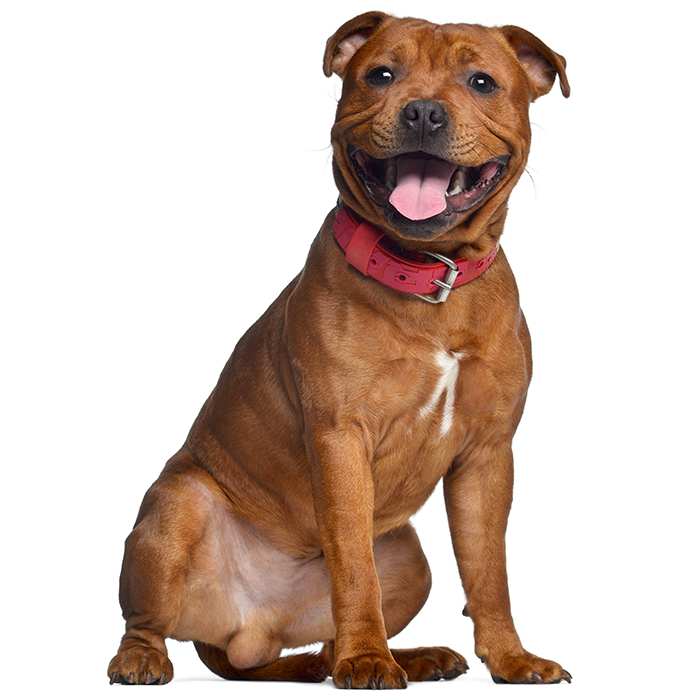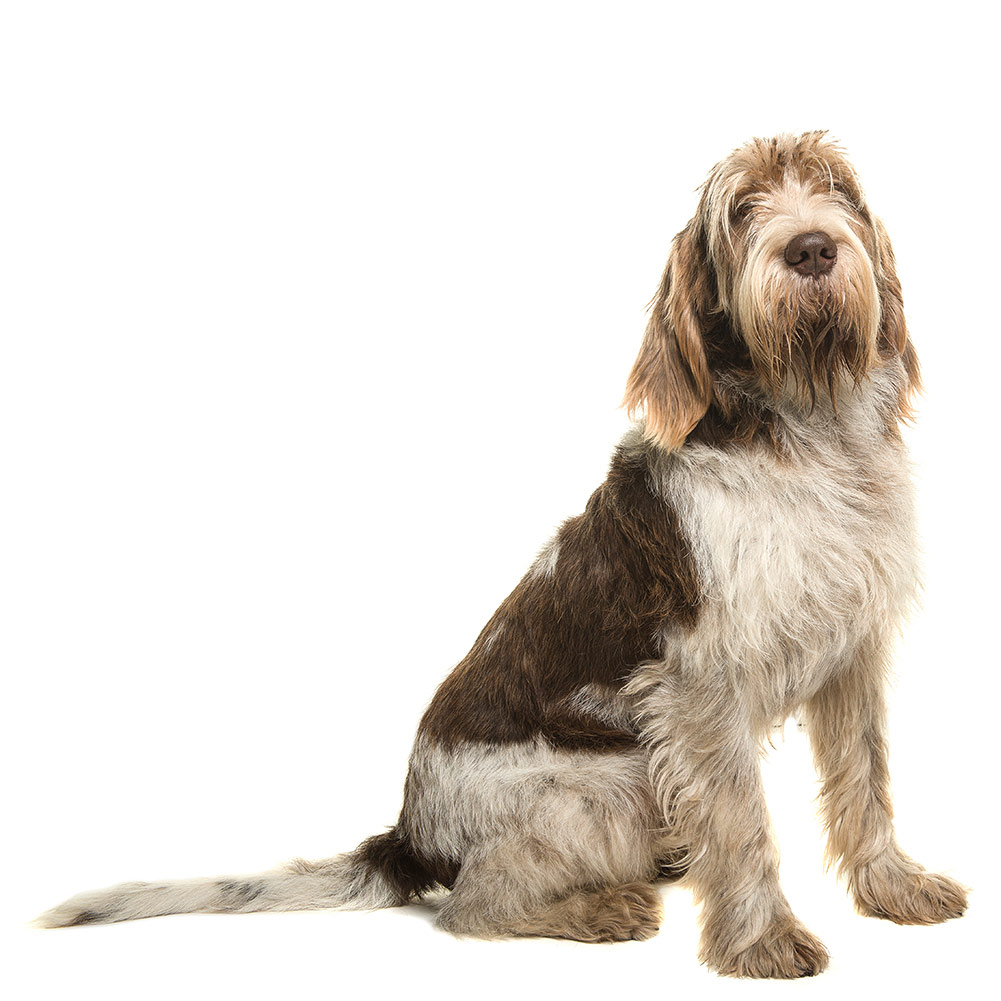German Wirehaired Pointer
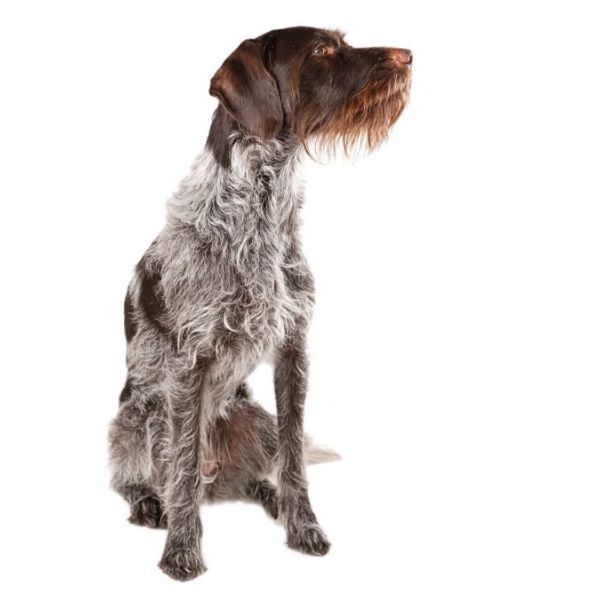

| Recommended for | Active families, hunters, wildlife rangers |
| Breed Classification | Sporting group (Gundogs) |
| Other names | GWP, Deutsch-Drahthaar |
| Lifespan | 12 -14 years |
| Size | Medium to large |
| Temperament | Affectionate, eager, loyal |
| Intelligence | High |
| Tendency to bark | Average |
| Maintenance Level | Medium |
| Health Risk | This breed has an around average probability of having health issues in its lifetime, hence it is one of the more affordable breeds to insure. |
Insuring a German Wirehaired Pointer?
Get award-winning cover with more benefits and up to 80% of eligible vet bills reimbursed. Find out about your cover options.
Get a quick quote
Is this breed right for you?
Try our breed selector quiz to find out your best matching breed!
Insuring a German Wirehaired Pointer?
Get award-winning cover with more benefits and up to 80% of eligible vet bills reimbursed. Find out about your cover options.
Get a quick quote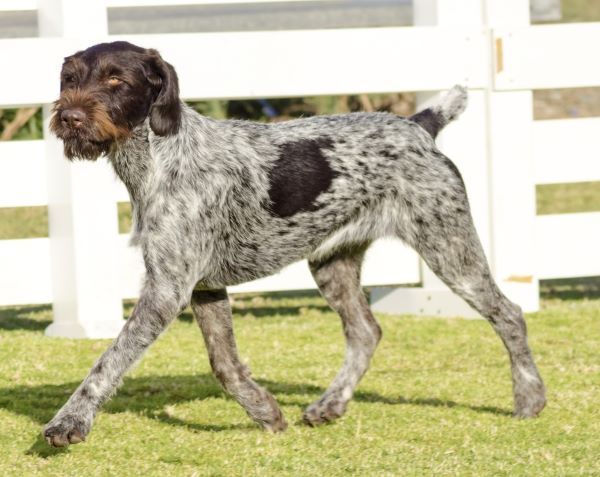
Breed history of German Wirehaired Pointers
“German Wirehaired Pointer” is the English version of the German breed name, “Deutsch-Drahthaar”. Drahthaar means “Wirehair”, while the word “Pointer” is not used in Germany to describe the breed.
The breeding of wire-coated pointing dogs was something of an obsession among German breeders of the early 1800’s. They wanted to develop a rugged, versatile, medium-sized hunting dog that would work closely with one person or a small party, hunting on foot in varied terrain, from mountainous regions to dense forests to more open rural areas.
The breed the Germans desired needed a coat that would be easy to maintain, yet would protect the dog when working in heavy cover or in cold water. This was achieved through careful crosses of the German Pointer with many other breeds. Sources differ on the exact lineage, although the Wirehaired Pointing Griffon, Pudelpointer, Stichelhaar, and Deutscher-Kurzhaar are thought to be the most likely contributors. The outcome was a dog that excelled at searching, locating and pointing game and was fully responsive to the needs of its hunter.
GWPs today have many roles. They are excellent dogs for the modern hunter who, much like the Germans of the 1800’s, wants a dog that can literally do it all. They compete successfully in conformation shows, horseback field trials, hunt tests, agility, obedience, and just about every type of performance event. They also serve as therapy dogs, drug detection dogs, and loyal companions who would rather sleep on their owners’ feet than anywhere else.
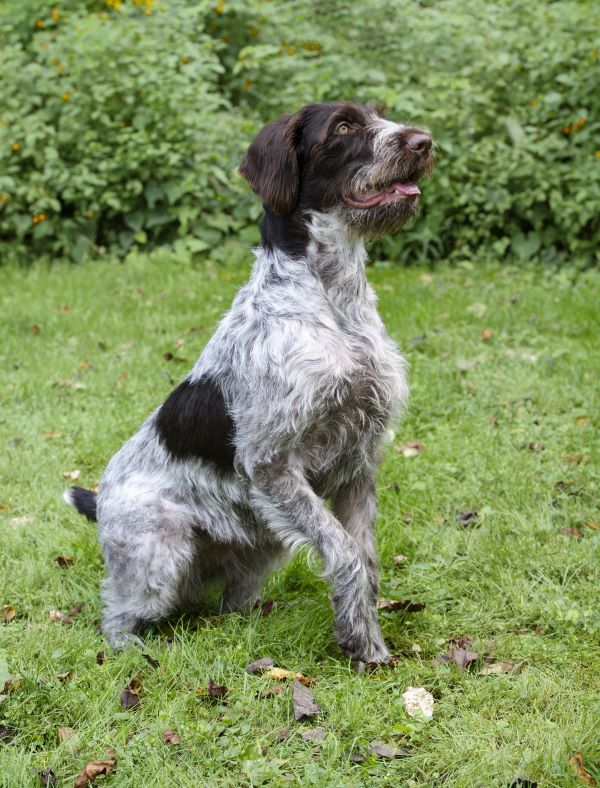
Physical description of German Wirehaired Pointers
The German Wirehaired Pointer is a sturdy, well-muscled, medium to large-sized dog built for strength, endurance and speed. With a distinctive appearance, the breed’s most distinguishing characteristics are its wire-like coat and its facial furnishings.
The thick, wiry outer coat is two to four centimetres in length, and is straight, harsh and flat lying. Weather-resistant and largely water-repellent, the GWP’s unique coat protects the skin from extreme weather and the dense cover it sometimes has to work in, as well as insulating the dog when it retrieves in freezing water.
The shaggy eyebrows and a harsh beard protect the eyes and face from the lacerations of thorny brush and add character to the dog’s facial expression. These physical attributes, paired with a fearless temperament, make the GWP perfect for hunting.
| Weight range | Males 25 to 30 kg; females 20 to 28 kg |
| Height range | Males 61 to 68 cm; females 57 to 64 cm |
| Colours | Liver, liver & white, black & white |
| Coat length | Medium |
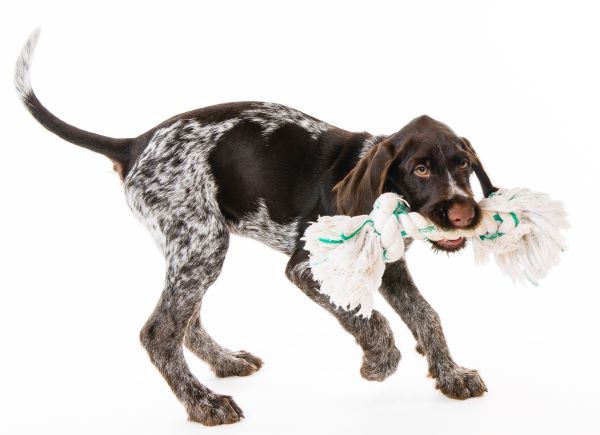
German Wirehaired Pointer personality and temperament
Loyal, affectionate and loving, German Wirehaired Pointers will adapt to their owners, who they want to please at all times. They have a wonderfully endearing nature and are often referred to as the clowns of the Gundog group. While they can sometimes be aloof and protective of their family, they do accept visitors willingly.
This breed is generally unsuitable as family dogs as they require a great amount of exercise, which just can’t be given by most families. They are not recommended at all for apartment living. To be truly happy as a family dog, they need to be taken on daily power runs and be given regular mental challenges to complete.
German Wirehairs are extremely intelligent and are keen learners, but have their own minds and are full of energy, so they won’t be happy lazing about or being on their own all day. They crave human companionship, and undesirable behaviours can result if they are regularly left alone for long periods of time. Make sure that you can provide the mental stimulation and outdoor activities they need before bringing one home.
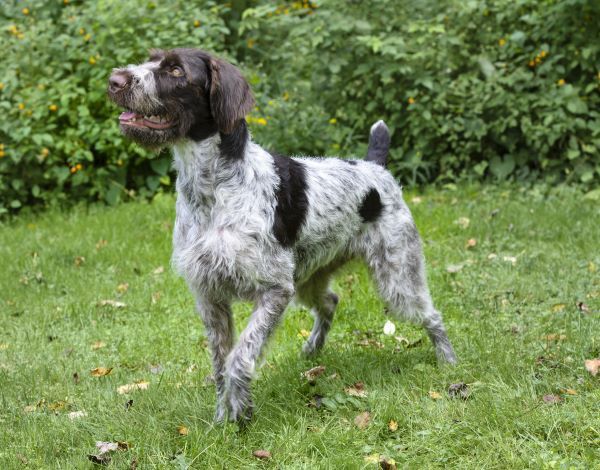
German Wirehaired Pointers with kids and other pets
Young German Wirehairs are typically fun loving and playful, and when they’re raised with children, are great companions. Older dogs that have not been raised with children may need strict supervision if sent to a home with young children.
The breed’s strong prey drive make it not the best choice for families with cats and other small animals. Puppies that are raised with cats often accept them as part of the family pack. Some adults make the transition from a non-cat to a cat-owning family, but other older GWPs who aren’t familiar with them may simply view them as another type of prey.
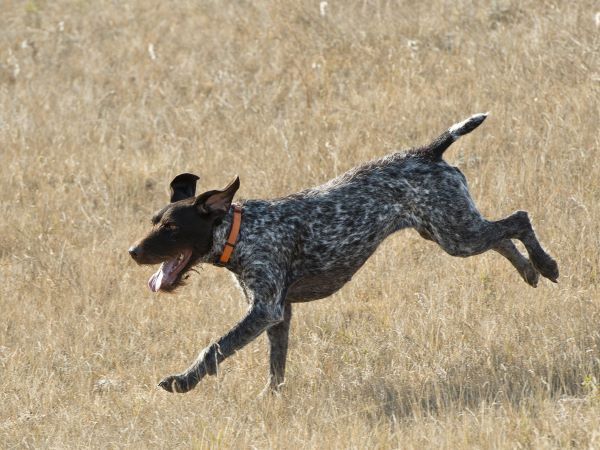
German Wirehaired Pointer training and exercise
The German Wirehaired Pointer is a very active dog who is well suited to life as a hunting companion. If you are considering this breed as a family pet, you need to commit to providing sufficient exercise and mental stimulation for its needs.
GWPs need plenty of physical activity at least twice a day, such as a good run, long brisk walk and/or high energy play session. Running, hiking, swimming, and organized dog-based sports are great activities for this breed. You should also give them plenty of toys and different kinds of activities around the house to keep them occupied. The breed is smart, talented, versatile, and athletic and excels in a wide range of canine sports and activities such as obedience, tracking, agility and rally, which provide plenty of physical and mental exercise.
Eager to please, quick-learning and responsive, like most sporting breeds German Wirehairs take well to training. However, they are creative and independent thinkers, so it’s important to establish rules, be consistent and prevent boredom setting in. Positive reinforcement techniques such as play, praise and food rewards are recommended. Early socialisation and puppy training classes will help to ensure that the GWP grows into a well-adjusted, well-mannered companion.
| Energy level | High |
| Exercise requirements | Very high |
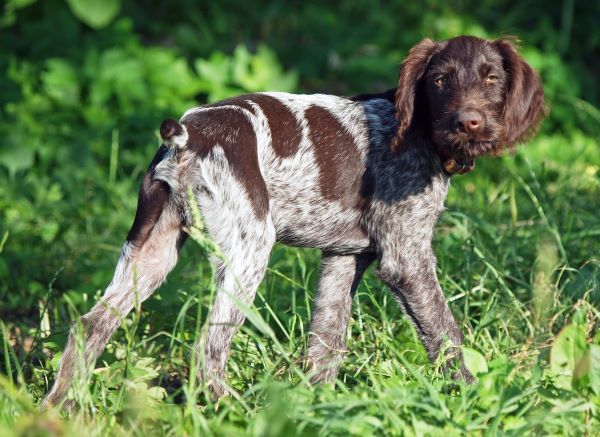
German Wirehaired Pointer feeding and nutrition
The German Wirehaired Pointer should be fed a premium, high-quality dog food appropriate to the dog’s age (puppy, adult, or senior), size and activity level.
Owners must be aware of the danger of bloat, where the stomach distends and twists. Don’t feed your GWP only once per day, don’t let them exercise until an hour after they eat, and don’t feed them immediately after exercising.
GWPs that aren’t sufficiently exercised may become overweight, so watch your dog’s calorie consumption and weight level and don’t overindulge in the treats department. Check with your vet if you have any concerns about your dog’s weight or diet.
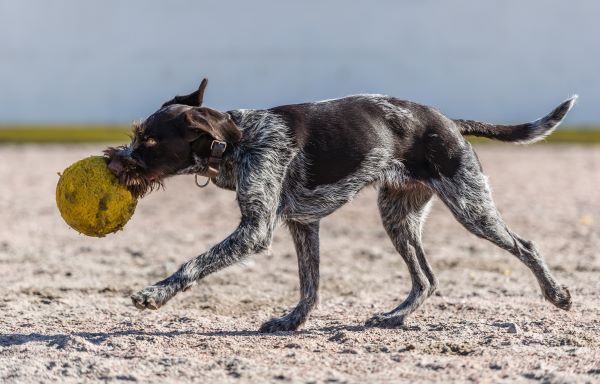
German Wirehaired Pointer care and grooming
The German Wirehaired Pointer’s harsh, wiry coat requires very little maintenance. A good brushing every few days with a comb and soft slicker brush will help to remove dirt and loose hair and keep the coat looking its best. The breed does shed, especially at hotter times of the year.
This breed’s ears and feet need particular attention. Owners need to take care to regularly inspect and clean and/or dry the ears if needed. The hair on the feet needs to be trimmed to prevent mud collecting between the toes.
Health issues for German Wirehaired Pointers
- Hip dysplasia and Elbow dysplasia are inherited conditions which occur when the ball and socket of the affected joint do not fit together properly. As these conditions can cause painful arthritis in the joint later in the dog’s life, it is essential to begin management and/or treatment of the condition as soon as possible. For elbow dysplasia, surgery may be recommended.
 Von Willebrand’s Disease is a blood disorder which impedes the blood’s ability to clot. This can lead to excessive bleeding post-surgery, nosebleeds, bleeding gums or blood in the stomach. It is currently incurable, and blood transfusions are the only treatments available. Most dogs suffering this disease can lead normal lives, and there are tests available to determine if yours has it.
Von Willebrand’s Disease is a blood disorder which impedes the blood’s ability to clot. This can lead to excessive bleeding post-surgery, nosebleeds, bleeding gums or blood in the stomach. It is currently incurable, and blood transfusions are the only treatments available. Most dogs suffering this disease can lead normal lives, and there are tests available to determine if yours has it.- Eye problems such as Entropion and Ectropion can be a problem for the breed. Entropion is a congenital condition in which the eyelids appear to roll inward against the cornea of the eye; this can cause a great deal of discomfort for the animal. With ectropion, the eyelids roll outward.
- Progressive Retinal Atrophy (PRA) describes a group of eye conditions in which an atrophy or degeneration of retinal tissue occurs. The first sign of progressive retinal atrophy is usually night blindness; this progresses to total blindness over a period ranging from months to years.
- Cardiomyopathy affects the heart, making it become weak and thin. It will eventually lead to heart failure since pumping blood around the body becomes too difficult. The condition is treatable with oxygen, fluid therapy and medication.
- Gastric Torsion, also know as bloat, occurs when a gas-filled stomach flips over on itself, twisting the opening to the oesophaegus and intestines. Without immediate veterinary care, the affected dog will die a very painful death.
Not all conditions are covered by Pet Insurance. For details of Bow Wow Meow Pet Insurance cover, refer to the Product Disclosure Statement.
Free engraved pet ID tag on sign up3
Customer Satisfaction
21 day cooling off
Easy to use Pet Portal


